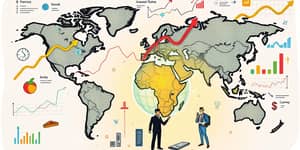Staying informed about personal finance news in 2025 can mean the difference between financial stress and long-term stability. As economic conditions shift, understanding the latest trends, statistics, and tools is crucial for protecting your wallet and planning for the future.
This article explores key developments in consumer sentiment, spending behavior, budgeting techniques, and emerging financial technology, providing actionable advice to help you navigate an ever-changing economic landscape.
Current Economic Landscape
The national economy remains a top concern for Americans in mid-2025. Recent surveys show that 70 percent of U S adults view the economy as poor, reflecting ongoing worries about inflation, job security, and rising living costs.
Credit obligations continue to weigh heavily on many households. With 41 percent of adults carrying credit card debt and 24 percent holding mortgages, the burden of interest payments and mortgage rates can strain monthly budgets.
Consumer Spending Trends for 2025
Shoppers are increasingly prioritizing eco-friendly options, with 58 percent willing to pay more for sustainable goods. Millennials (60 percent) and Gen Z (58 percent) lead this shift, closely followed by urban consumers at 60 percent.
Despite a growing interest in sustainability, only 11 percent of consumers purchased secondhand items online within the past week, a 24 percent decline since 2021. Transparency in business practices matters, as 43 percent of buyers want brands to actively prioritize environmental responsibility.
Consumer loyalty is fragile. Over half of customers reduce spending after a single bad experience, yet improving customer experience from two stars to three can boost repeat purchase likelihood by 68 percent and recommendations by 97 percent.
Budgeting and Saving Strategies
Amid concerns about overspending, many are rediscovering analog budgeting tools. The cash envelope budgeting system offers a tangible way to control discretionary spending in a world dominated by cards and mobile wallets.
Traditional categories remain critical for tracking expenses. Allocating funds systematically can help you stay on top of necessities and long-term goals.
- Housing and utilities
- Transportation and fuel
- Food and groceries
- Healthcare and insurance
- Debt payments and savings
- Retirement and education funds
- Entertainment and personal expenses
Embracing Technology in Finance
Financial apps and mobile wallets continue to revolutionize how we manage money. From real-time expense tracking to automated transfers, technology offers convenience and greater control.
Many users benefit from a frictionless digital payment experience, linking bank accounts, credit cards, and budgeting tools in one place. Yet, a balanced approach that combines digital insights with hands-on methods can yield the best results.
- Personal finance apps with real-time alerts
- Automated savings and investment platforms
- Peer-to-peer payment services
- Mobile bill payment and reminders
Charting a Course to Financial Wellness
Looking ahead to the next four years, only 35 percent of Americans feel optimistic about their financial future. Younger adults (45 percent) are more hopeful than those over 65 (27 percent), highlighting an economic optimism and pessimism gap by age.
Achieving long-term stability requires focus on key areas that adapt to changing circumstances and income levels.
- Improve budgeting habits and debt management
- Enhance financial wellness through planning and disciplined saving
- Conduct regular reviews and adjust strategies as needed
By addressing these priorities and staying informed about macroeconomic shifts, you can build resilience against unexpected expenses and optimize your path to financial freedom.
Whether you leverage analog techniques like cash envelopes or embrace the latest fintech innovations, the combination of awareness, discipline, and adaptability will empower you to make informed decisions that safeguard your wallet.
Start today by reviewing your spending, setting clear goals, and choosing the tools that align with your lifestyle. With the right strategies, you can navigate the complexities of 2025 and beyond, turning financial uncertainty into an opportunity for growth and stability.
References
- https://www.morganstanley.com/articles/financial-planning-new-year-financial-resolutions
- https://www.experian.com/blogs/ask-experian/latest-personal-finance-news/
- https://meetglimpse.com/personal-finance-trends/
- https://www.deloitte.com/global/en/services/consulting-financial/perspectives/future-finance-trends-2025.html
- https://moneywise.com/research/personal-finance-statistics
- https://www.gwi.com/blog/consumer-spending-trends
- https://localfirstbank.com/article/budgeting-101-personal-budget-categories/
- https://www.qualtrics.com/blog/global-consumer-trends/










